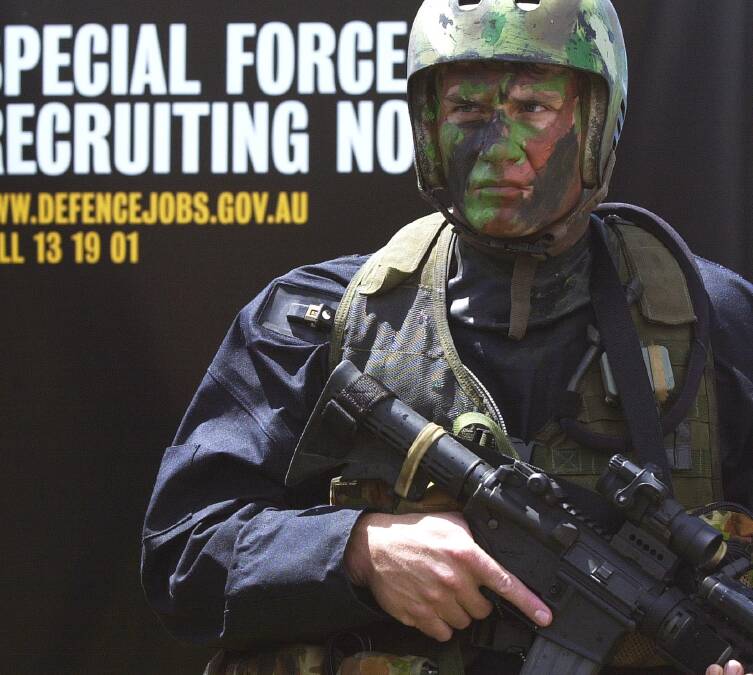
"We have a serious problem with recruiting talent into Defence."
These were the chilling yet refreshing words of Matt Thistlethwaite, assistant minister for Defence, at our Defence Industry event on Thursday evening.
And he's right. Australia is losing that battle.
Bob Hawke and Kim Beazley fought their own war for military talent in the '80s. Instead of relying on the usual recruitment ads, Hawke jumped in the front seat of an Australian Army Bell OH-58 helicopter and made his appeal directly to the hearts of young Australians like me. I remember the message - "apathy, that is our enemy".
It must have worked. I joined the Sydney University Regiment at that time, and still serve in the Army part-time today.
Apathy is still our enemy. But the appeal we've been making - for Australians to put on a Defence uniform, or join Defence as public servants, or Defence Industry - hasn't energised people into joining.
When I look at the messages in defence recruitment ads, they have none of the energy of Bob Hawke's appeal to help protect the country. Outdoor ads I've seen make an appeal to the ego, about what I can do "in my Army". Yesterday, I saw a recruitment ad for a defence company, and their lead message was, "no dress code."
Doesn't exactly inspire one to sacrificial service, does it?
You could say Australia is losing on three fronts. On the uniformed side of Defence, the people who fire the bullets, we have 3000 fewer warfighters than we need. On the public service side, the people who organise the bullets, we're behind by 1000. At this point, the overall Australian Defence Organisation - that's the uniformed people and the public servants - will struggle to reach its goal of 101,000 Defence personnel by 2040.
However, it's the third front that worries me - Defence Industry. We're the people who make the bullets, and the military hardware and software our warfighters need. My company has been on the lookout for talent to fill a range of positions all year.
The industry doesn't use messages that appeal to people's desire to protect their country, or our need to support our allies, because we don't believe they will work. Then I met a retired Royal Australian Navy Commander Rob Wilson. And I changed my mind.
I heard about Rob from a friend of a friend. After a long career on minesweepers, aircraft carriers and frigates, he became restless and went to make money in crypto currencies, getting out when the writing was on the wall. Now he'd like to feed his sense of purpose. That wasn't going to happen in finance. He looked at a couple of roles in the defence industry, but they were disconnected from the things that first energised him about defence - helping the warfighter in their fight.
We got in touch. I didn't spend a lot of time talking about the salary package - which was roughly the same as other companies offered. Instead I talked about our system, how it delivers information directly to the operator, helping them make combat decisions fast. How it connects the operator to other forces, including allies, creating what's known as "interoperability". From there, I took a risk, and talked about how what we do is supporting the western Alliance.
It paid off. I'd like to say it was the strength of my magnetic personality, but it wasn't. Rob was so happy to come back to the Defence community because of our story of helping Australia and her allies. He wanted to contribute. Patriotic energy Bob Hawke would be proud of.
Far from being something to be ashamed of, Rob's patriotism is a huge asset. His passion for securing Australia, and protecting her interests, is infectious. It energises the team and the defence customers we work with too. Lots of the technical skills he may need can be learnt, but esprit de corps is a gift worth so much more.
How can the Defence Industry find more talent, like Rob? We need to look back down the road and see where people left Defence. Ten years ago, a whole lot of talent jumped out of Defence to make money while the mining industry was running hot. But making money can only satisfy for so long. Why don't we see if we can get them back into defence?
We may need to make the door into Defence a little wider too. As Minister Thistlethwaite explained, we need all kinds of patriots to serve our country. And not necessarily in uniform. We need a new generation of cyber warriors in our joint operations and super-smart engineers in the Defence Industry. Not to mention big-hearted retired Navy Commanders. People shouldn't be prevented from contributing because they've had some minor medical condition, such as ADHD treatment when they were children, or a peanut allergy, or because they've advanced north of 50.
The global outlook has become more precarious than any time I've known. To mount a credible defence, we must build up our talent base now. To bring that talent in, we may be surprised at how strongly people are motivated by a desire to do something for their country.
- David Horton lives and works in Canberra. He serves on the board of the Australian Defence Information and Electronic Systems Association (ADIESA).







